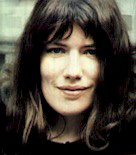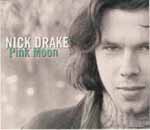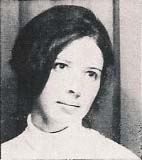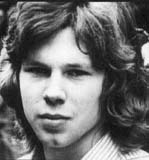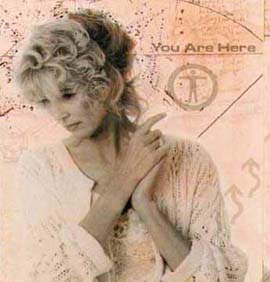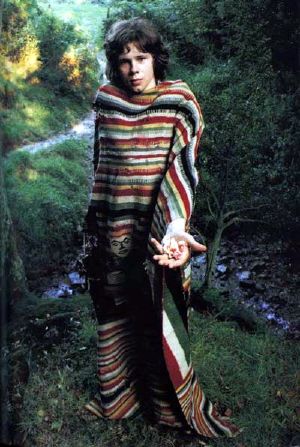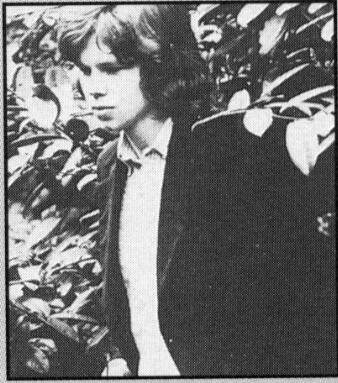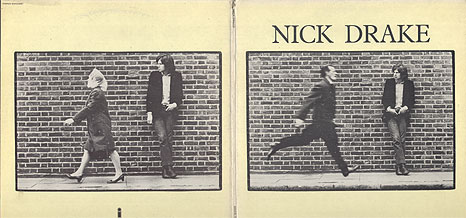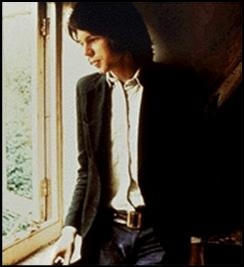 | Nick Drake (1948-1974) |
|
Джо Бойд (Joe Boyd) |
Bridget St. John |
"Nobody cares how steep my stairs, and nobody smiles if I cross their stiles" |
|
Robin Frideric, 1967 |
Ribin Frideric |
Nick Drake 1968 |
|
Nick |
|
Robin Frederick - USA - Compared by the media to Enya and Enigma, Robin''s written and produced over 500 songs for record albums and television series, and recorded 3 solo albums. She teaches songwriting in the Los Angeles area and is working on an album of dance/electronica collaborations |
|
http://www.smooth-jazz.de/ArtistsF3.html |
|
|
|
|
|
|
Nicholas Rodney Drake (June 19, 1948 – November 25, 1974) was an English singer-songwriter and musician best known for his acoustic, autumnal songs. His primary instrument was the guitar, while he was also proficient at piano, clarinet, and saxophone. Although he failed to find a wide audience during his lifetime, Drake''s work has since grown steadily in stature, to the extent that he is now widely considered one of the most influential singer-songwriters of the last 50 years. Drake signed to Island Records when he was twenty years old, and released his debut album Five Leaves Left in 1969. By 1972 he had recorded a further two albums, although none sold more than five thousand copies during their first release, and his reluctance to perform live or be interviewed contributed to his lack of commercial success. Drake battled with depression and insomnia throughout his life, and the topics were often reflected in his lyrics. Upon completion of his third album, 1972''s Pink Moon, he withdrew from both live performance and recording, retreating to his parents'' home in rural Warwickshire. On 25 November, 1974, Nick Drake died from an overdose of antidepressants, at the age of 26. There was residual interest in Drake''s music through the mid-1970s, but it was not until the 1979 release of the retrospective album Fruit Tree that his back catalogue came to be reassessed. By the mid-1980s, Drake was being credited as an influence by such artists as Robert Smith, and Peter Buck. In 1985, The Dream Academy reached the UK and US charts with "Life in a Northern Town", a song written for and dedicated to Drake. By the early 1990s, he had come to represent a certain type of ''doomed romantic'' musician in the UK music press, and was frequently cited by artists including Kate Bush, Paul Weller, and The Black Crowes. Drake''s first biography was written in 1997, and was followed in 1998 by the documentary film A Stranger Amongst Us. In 2000, Volkswagen featured the title track from Pink Moon in a television advertisement, and within one month Drake had sold more records than he had in the previous thirty years.Dann (2006), p 208–209
from WiKi'' see http://starling.rinet.ru/music/drake.htm
http://news.bbc.co.uk/1/hi/entertainment/music/3710667.stm
http://www.screamyell.com.br/musicadois/nick_drake.htm
http://www.isound.com/nick_drake
http://www.puremusic.com/52drake.html
10.05.2007. The American Cinematheque presents a special evening saluting Nick Drake at Grauman''s Egyptian Theater in Hollywood. The event - titled "A Place To Be - A Celebration of Nick Drake" - includes the official Los Angeles Premiere of "A Skin Too Few" and includes the World Theatrical Premiere of a series of short filmed homages to Nick Drake- created by admirers including Heath Ledger, Jonas Mekas and Tim Pope - collectively titled "Their Place: Reflections On Nick Drake". Special guests Gabrielle Drake, Joe Boyd and Robin Frederick will be on hand for a Q+A panel discussion.
Джо Бойд (Joe Boyd) - Люди андерграундного Лондона о Сиде Барретте
http://pink-floyd.ru/articles/articles/barrett/about_syd_for_pf_ru.html -
Robin Frederick is a professional songwriter, music producer and recording artist. Nick Drake''s recording of her song "Been Smoking Too Long" appears on the TIME OF NO REPLY album.
Robin wrote this song in spring,1967, for Nick Drake. It was recorded that summer by John Martyn on his album LONDON CONVERSATION. For more details, read NICK DRAKE - A Place To Be. Robin recorded this home demo in 1968. It has not been previously available.
Sandy Grey
Words & Music by Robin Frederick
Oh Sandy Grey
Are you going away
Leave me a message before parting
Time has changed you
And the things that pained you
Are the things you think of as you''re starting
Oh Sandy Grey
It''s only this I pray
That you might stay here one more day in laughter
Won''t you hang around and hold me
Repeat all the lies you told me
Do your rambling after
Oh Sandy Grey
Don''t leave me just today
Don''t think on the road you''ll be going
Think of all the time
And the days we''ve had to mind
Of the future there''s no way of knowing
Oh Sandy Grey
I thought I heard you say
You ain''t heard one word that I''ve been speaking
There''s no use in tryin''
You''re escaping from my mind
And I''ll never see the road you''re seeking.
Oh Sandy Grey
Are you going away
Leave me a message before parting
Time has changed you
And the things that pained you
Are the things you think of as you''re starting.
WATER FALLS DOWN showcases nine intoxicating new songs from Robin Frederick, an artist with a vocal sound reminiscent of Dusty Springfield and Sade, the deep grooves of Enigma, and uniquely poetic lyrics. With the backing of groove-master Roy Campanella III and guitar greats Grant Geissman and Michael Sims, these tracks glow with an other-worldly warmth. From the chill groove of O Sleeper, O Outsider - hailed as "...a miraculous breakthrough into a feeling world" by British music critic Ian MacDonald - to the worldbeat/trance rhythm of The Messenger, this album takes the listener on a journey through the shadowy depths of extreme romance.
INFLUENCES: Enigma, Enya, William Orbit, Sade, Sarah McLachlan. Also influenced by the songwriting innovations of Nick Drake. Read NICK DRAKE - A PLACE TO BE at www.robinfrederick.com. Originally published in MOJO Magazine, this article explores Drake''s pioneering use of offset melodic phrasing, cluster chords, and more.
ARTIST HISTORY: (The CliffNotes version) Robin has written and produced over two hundred songs for television and record albums. From 1994 to 1997 she was Director of A&R at Rhino Records where she oversaw production of several dozen albums including The Schoolhouse Rock box set and The New Age Collection. She is past president of Los Angeles Women In Music and co-founder of Indie Nation, a music conference for independent recording artists.
Further informations:
http://www.cdbaby.com/cd/frederick2
Soundsamples:
http://www.cdbaby.com/cd/frederick2
http://www.robinfrederick.com/index.html
http://www.mp3.com/Robin_Frederick
The Nick Drake CD Remasters: an interview with Cally
I was introduced to Cally by Gabrielle Drake who called him "the driving force" behind the CD remasters of Nick Drake''s three albums. The remastering of these CDs opened a sonic doorway into the brilliance and depth of the original vinyl recordings, and the story of how they came to be is a fascinating one. Cally is currently working with Gabrielle, John Wood and Joe Boyd on a CD of material culled from Nick''s home tapes and other sources. He was able to share some information about this project although it is still in the early stages. Update at bottom of page. (Robin Frederick, December, 2001)
ROBIN: I understand you were very much involved in the recent CD remastering of Nick''s three albums. Would you describe your role in that project?
CALLY: Please allow me to ramble a bit:
I was once a marketing manager at Phonogram Records in London, they were owned by PolyGram, a Philips Electrical Company division. I became aware of CDs when they were introduced to the UK in the early 80s. Though the launch by Philips was dreadful I soon saw the advantages of this new format. In their panic at CD not being taken seriously, they gave all of us executives a player to use in our offices, to show off to our artists. I ordered up all of the Decca Rolling Stones albums on CD and played them all day. I only noticed how good these particular CDs were when I went back to vinyl. This is no criticism of the vinyl format, more a criticism of the way that vinyl was mastered in those days. Our vinyl test pressings were always dreadful, yet our early CDs sounded great. Great as in LOUD and clear. Over the years, we had chosen to neglect the quality of the re-pressings of classic old albums.
In 1986 I managed Julian Cope, and signed him to Island Records. At that time they [Island] were about to celebrate their 25th birthday, and they were going to release tons of their old albums on CD, including Nick''s 3 titles. I was deeply impressed that Chris Blackwell insisted that Nick''s titles as well as Sandy Denny''s would never be deleted no matter how few were selling. Nick sold about 20 albums a month, so their decision to release them on CD was brave (or foolhardy) to say the least.
When Nick had finished recording his albums, John Wood would go to the cutting rooms and attempt to get all the beautiful sound down onto vinyl in what was known as ''the cut''. This meant that he had to make some decisions about how to compromise the original sound with the limitations dictated by vinyl record manufacture: certain frequencies have to be curbed, and volume levels have to be tamed. After this is done, a tape is made called an EQ''d Production Master. This tape is not the original master, but the result of the compromises John would have made to suit vinyl. I should say here, that John was usually very happy with these compromises. When he recorded any artist, as an engineer, he would have had to think about the future requirements of the manufacturing process, and many of the necessary limitations may have been adopted in the studio for Nick to hear. The only 3 people to hear what it was like to stand next to Nick whist he played were John, Joe Boyd and Nick, when the tape was played back. Probably a tea lady too.
A common falsehood is that recording technology was still primitive in 1968. This is not true at all. The second world war developed recording technology to a peak where Nelson Riddle could record Frank Sinatra in ways that sound amazing even today, never mind George Martin and The Beatles.
Because releasing Nick Drake on CD was a tad ambitious, Island had to do it as cheaply as possible. Managing an artist on Island enabled me to get all 3 CDs for free, and I was aghast at how bad they sounded. These were not like those Rolling Stones CDs at all. They had merely cut the CD from the EQd master tape, and all the limitations, designed for vinyl, were apparent on the CD, not to mention the tape hiss.. I thought that they sounded terrible in comparism to the vinyl LPs.
Record Companies are notorious for losing master tapes, I''m not sure what tapes they used to manufacture the CDs from, but they were really poor. The sleeves were no better. 3 sides of poorly reproduced album artwork reduced to the size of a packet of cigarettes, and a whole page telling you how to clean a CD in 4 different languages, ptchah.
It was here that some minion in the production department decided to retitle ''Road'' as ''Radio'' amongst many other unchecked errors.
It is important to point out, here, that, after you get past the sheer amazement of Nick''s melodies; of his guitar playing; of the arrangements; of his voice; of his lyrics; of the performance; of the textures and tones in the playing, you appreciate how beautifully all these elements were captured by Joe and John.
Of their era I put these recordings as the very best of their kind, along with the recordings of Sandy Denny and Scott Walker perhaps. The warm tones in the guitar and in Nick''s voice are crucial, to me, and very innovative of their time and within their genre. If you listen to Roy Harper''s records, or Michael Chapman, their records are quite harsh and abrasive. Something else happened with Nick, and even John Martyn, that set them apart from the more rustic sounds of the ''folk'' scene. I''m sure that Chris Blackwell would see this as a perculation of all the other black artists on the label seeping into the nice white boys. Or maybe not. These first CD releases, then, didn''t really reflect the beauty of the recordings (or of the sleeves even).
I returned to Island as Creative Director in the early nineties. At this time Nick was still a tiny cult, but sold a few more CDs. Island had been bought by PolyGram and they had a vicious deletions policy if any one title fell below a minimum sales target in any one month. Chris Blackwell had negotiated his way out of this particular clause in the sale, so any deletions had to be personally sanctioned by him. Of course Nick was always put forward for the chop, and, of course, this was always rejected. The fact that Nick''s albums were always readily available on sale must have helped speed up the growth in interest in his music. Anytime anyone saw a mention of his name, say, another current artist admiring Nick, then they could go and buy any of the CDs with relative ease. This long-sighted policy is extinct in major record companies now. If a CD stops selling, then the stocks are swiftly returned by the shops, they are then reduced in price, sold-off and deleted. Unlike Tim Buckley, or Fred Neil, for instance; Nick''s music was easily accessible to any UK purchaser.
Joe Boyd had always rather disliked the earlier ''Heaven In A Wild Flower'' compilation, and one day suggested that it may be time for a new compilation. He asked me to do the sleeve, and for Trevor Wyatt in A &R to help source the tapes. Joe spent ages on the track listing, and we compiled it to run the full length of a CD, not to run like vinyl put onto CD with a side one and two. Indeed, we never released it on vinyl, not even as a limited edition. Joe reproduced the mastering part, and got a far, far better sound out of the original tapes then was evident on the previous CDs. Indeed, ''Way To Blue'' was the way to go, and really did Nick and John Wood justice. It was then that I argued that we had to update the 3 studio CDs, I was apalled that they were still in their 1986 condition. I left Island in 1997 but continued to lobby them hard for these re-issues. By then I was working with Gabrielle Drake, so it became easier to get the work done. She had a very good relationship with Island, and they readily agreed to get their finger out and so to update the 3 studio albums.
Joe was less involved at this later stage, he was largely based in the US running his Hanibal label through Ryko. John was bought down from his Scottish home and he re-mastered the three albums in London. My role was to co-ordinate all of the mastering, the finding of tapes, correcting all the lyrics back to Nick''s original transcripts etc, re-scanning and retouching all of the artwork, and clearing the use of new photos from Keith Morris, I babysat the project right up until they were let loose in shops and to Ryko in the US.
That''s a very long way of getting to the answer to your question.
ROBIN: What did you want to accomplish with the remasters?
CALLY: John wanted CDs that sounded as good as the vinyl, and we had my old vinyl copies in the mastering room at the time. He found it very easy to re
Robin Frederic about Nick
Robin Frederic''s and Bridget St. John''s CD
Robin Frideric about Nick
Nick''s web side
Music Fond

